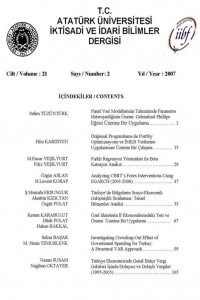Öz
Bu çalışma, FSMH’dan biri olan coğrafi işaretlerin korunması ile
ilgili tarihsel gelişimi ve coğrafi işaretlerin (Cİ’lerin) ekonomik etkilerini,
özellikle gelişmekte olan ülkeler için irdelemektedir. Ayrıca, Lizbon Anlaşması
dahilinde dünyada korunan Cİ’lerin ürünlere ve ülkelere göre dağılımına
bakılmıştır. Cİ korumasından diğer FSMH’nda olduğu gibi en çok gelişmiş
ülkelerin faydalandıkları gözlemlenmiştir. Diğer gelişmekte olan ülkelerde
olduğu gibi, Türkiye’nin de coğrafi işaret korumasından, dolayısıyla da
ekonomik kazançlardan yeterince faydalanamadığı tespit edilmiştir. Cİ
korumasının sağlayabileceği ekonomik kazançların elde edilebilmesi için
gerekli kurumsal altyapının tesis edilmesi gerekmektedir. Böylece, Cİ koruması,
diğerlerinin yanında kırsal alanlara gelir ve istihdam sağlayan, ihracat gelirlerini
arttıran bir politika aracı olarak kullanılabilecektir.
Anahtar Kelimeler
Fikri ve Sınaî Mülkiyet Hakları Coğrafi İşaretler Ekonomik Kalkınma.
Kaynakça
- Addor, F. ve Grazioli, A. (2002), ‘Geographical Indications Beyond Wines and Spirits’ The Journal of World Intellectual Property, 5(6), 865-897.
- Addor, F., Thumm N.ve Grazioli A. (2003), ‘Geographical Indications: Important Issues for Industrialized and Developing Countries’, The IPTS Report, May, No 74, 24-31.
- Agarwal, S. ve Barone M. (2005), ‘Emerging Issues for Geographical Indication Branding Strategies’, MATRIC Research Paper 05-MRP 9, Iowa State University.
- Babcock, B. A. ve Clemens R. (2004), ‘Geographical Indications and Property Rights: Protecting Value-Added Agricultural Products’, MATRIC Briefing Paper 04-MBP 7, Iowa State University.
- Chaturvedi, S. (2003), ‘India, the European Union and Geographical Indications: Convergence of Interests and Challenges Ahead’ South Asia Economic Journal 4(1):99-110.
- Escudero, S. (2001), ‘International Protection of Geographical Indications and Developing Countries’, Trade-Related Agenda, Development and Equity, Working Papers 10, July.
- Finansal Forum, 5 Mayıs 2003.
- Gökovalı, U. (2004), ‘Trends in Patenting Activities: Worldwide Evidence and Turkish Case’, Ekonomik Yaklaşım, 15 (50), 13-29.
- Kumar, R. ve Naik, V. (2006), http://www.wipo.int/sme/en/ index.jsp?sub_ col=sme-cs&cat=geographical%20indications, erişim tarihi 2-6-2006.
- OECD, (1994), The Measurement of Scientific and Technological Activities: Using Patent Data as Science and Technology Indicators Patent Manual 1994, OECD/GD (94)114, Paris.
- Passeri, S. (2006), ‘International Legal Protection of Geographical Indications: European and Asian Experiences’ ECAP II, Thailand, 21 April 2006.
- Rangnekar, D. (2004), ‘The Socio-Economics of Geographical Indications’ ICTSD-UNCTD, Issue paper No. 8.
- Thieding F., ve Sylvander B. (2000), ‘Welcome to Club? An Economical Approach to Geographical Indications in the European Union’, Agrarwirtschaft, 49(12), 428-437.
- TPE (2004), Sınai Mülkiyet ile ilgili Uluslar Arası Anlaşmalar ve Türkiye’nin Bu Anlaşmalarla İlgili Durumu, TPE, Ankara.
- TPE (2007a), http://www.tpe.gov.tr/tpe/index.jsp?sayfa=240, erişim tarihi, 22- 02-2007.
- TPE (2007b), http://www.tpe.gov.tr/tpe/index.jsp?sayfa=201, erişim tarihi, 22- 02-2007.
- TPE(2007c),http://www.tpe.gov.tr/dosyalar/yayinlar/bilgikitapciklari/ Cografiisaretler. pdf, erişim tarihi, 22-02-2007.
- TPE (2007d), http://www.tpe.gov.tr/tpe/index.jsp?sayfa=241, erişim tarihi, 20- 02-2007.
- WIPO (2001), ‘Standing Committee on the Law of Trademarks, Industrial Designs and Geographical Indications’, Sixth Session, Geneva, March 12-16.
- WIPO (2003a), ‘Economic Importance of Trademarks and Geographical Indications and Their Use in Commerce’, National Seminer on the Protection of Trademarks and Geographical Indications, March 17-19, Beirut.
- WIPO (2003b), ‘International Framework for the Protection of Trademark and Geographical Indications’, National Seminer on the Protection of Trademarks and Geographical Indications, March 17-19, Beirut.
- WIPO (2007a), http://www.wipo.int/about-ip/en/about_geographical_ind. html#P16_1100 erişim tarihi, 22-02-2007.
- WIPO (2007b), http://www.wipo.int/treaties/en/ShowResults.jsp?lang= en& treaty_id=2 erişim tarihi, 22-02-2007.
- WIPO (2007c), http://www.wipo.int/lisbon/en/, erişim tarihi 20-02-2007
Öz
Kaynakça
- Addor, F. ve Grazioli, A. (2002), ‘Geographical Indications Beyond Wines and Spirits’ The Journal of World Intellectual Property, 5(6), 865-897.
- Addor, F., Thumm N.ve Grazioli A. (2003), ‘Geographical Indications: Important Issues for Industrialized and Developing Countries’, The IPTS Report, May, No 74, 24-31.
- Agarwal, S. ve Barone M. (2005), ‘Emerging Issues for Geographical Indication Branding Strategies’, MATRIC Research Paper 05-MRP 9, Iowa State University.
- Babcock, B. A. ve Clemens R. (2004), ‘Geographical Indications and Property Rights: Protecting Value-Added Agricultural Products’, MATRIC Briefing Paper 04-MBP 7, Iowa State University.
- Chaturvedi, S. (2003), ‘India, the European Union and Geographical Indications: Convergence of Interests and Challenges Ahead’ South Asia Economic Journal 4(1):99-110.
- Escudero, S. (2001), ‘International Protection of Geographical Indications and Developing Countries’, Trade-Related Agenda, Development and Equity, Working Papers 10, July.
- Finansal Forum, 5 Mayıs 2003.
- Gökovalı, U. (2004), ‘Trends in Patenting Activities: Worldwide Evidence and Turkish Case’, Ekonomik Yaklaşım, 15 (50), 13-29.
- Kumar, R. ve Naik, V. (2006), http://www.wipo.int/sme/en/ index.jsp?sub_ col=sme-cs&cat=geographical%20indications, erişim tarihi 2-6-2006.
- OECD, (1994), The Measurement of Scientific and Technological Activities: Using Patent Data as Science and Technology Indicators Patent Manual 1994, OECD/GD (94)114, Paris.
- Passeri, S. (2006), ‘International Legal Protection of Geographical Indications: European and Asian Experiences’ ECAP II, Thailand, 21 April 2006.
- Rangnekar, D. (2004), ‘The Socio-Economics of Geographical Indications’ ICTSD-UNCTD, Issue paper No. 8.
- Thieding F., ve Sylvander B. (2000), ‘Welcome to Club? An Economical Approach to Geographical Indications in the European Union’, Agrarwirtschaft, 49(12), 428-437.
- TPE (2004), Sınai Mülkiyet ile ilgili Uluslar Arası Anlaşmalar ve Türkiye’nin Bu Anlaşmalarla İlgili Durumu, TPE, Ankara.
- TPE (2007a), http://www.tpe.gov.tr/tpe/index.jsp?sayfa=240, erişim tarihi, 22- 02-2007.
- TPE (2007b), http://www.tpe.gov.tr/tpe/index.jsp?sayfa=201, erişim tarihi, 22- 02-2007.
- TPE(2007c),http://www.tpe.gov.tr/dosyalar/yayinlar/bilgikitapciklari/ Cografiisaretler. pdf, erişim tarihi, 22-02-2007.
- TPE (2007d), http://www.tpe.gov.tr/tpe/index.jsp?sayfa=241, erişim tarihi, 20- 02-2007.
- WIPO (2001), ‘Standing Committee on the Law of Trademarks, Industrial Designs and Geographical Indications’, Sixth Session, Geneva, March 12-16.
- WIPO (2003a), ‘Economic Importance of Trademarks and Geographical Indications and Their Use in Commerce’, National Seminer on the Protection of Trademarks and Geographical Indications, March 17-19, Beirut.
- WIPO (2003b), ‘International Framework for the Protection of Trademark and Geographical Indications’, National Seminer on the Protection of Trademarks and Geographical Indications, March 17-19, Beirut.
- WIPO (2007a), http://www.wipo.int/about-ip/en/about_geographical_ind. html#P16_1100 erişim tarihi, 22-02-2007.
- WIPO (2007b), http://www.wipo.int/treaties/en/ShowResults.jsp?lang= en& treaty_id=2 erişim tarihi, 22-02-2007.
- WIPO (2007c), http://www.wipo.int/lisbon/en/, erişim tarihi 20-02-2007
Ayrıntılar
| Birincil Dil | tr;en |
|---|---|
| Bölüm | Makaleler |
| Yazarlar | |
| Yayımlanma Tarihi | 27 Kasım 2010 |
| Yayımlandığı Sayı | Yıl 2007 Cilt: 21 Sayı: 2 |





